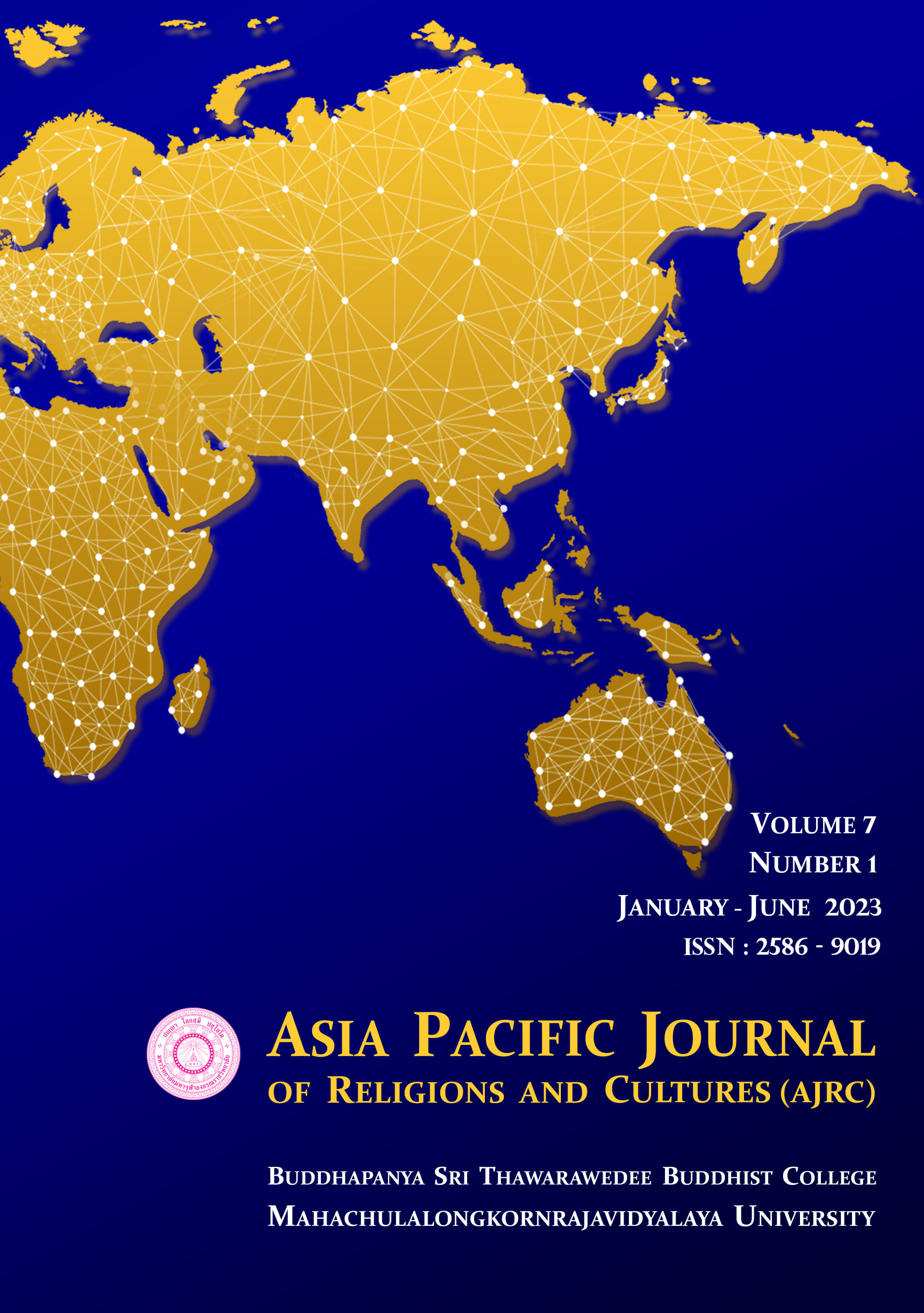REFLECTIONS ON THE INNOVATION OF THE NEW PUBLIC MANAGEMENT ON THE MONKHOOD AFFAIRS IN WAT PA LE LAI VARAVIHÃRA, AMPHOE MUANG: SUPHANBURI PROVINCE
Main Article Content
Abstract
Abstract
This research aims to study the qualitative reflections: 1) to reflect on New Public Management innovation to address the monkhood affairs and 2) to reflect on the monkhood affairs in Wat Pa Le Lai Varavihãra, Amphoe Muang: Suphanburi Province. Documentary exploration and in-depth interviews were conducted with 3 Most Venerable monks, i.e. Dean/representatives of The Buddhist Region 14, Provincial Chief/representatives of Suphanburi Province and the Abbot/representatives of Wat Pa Le Lai to accomplish triangulation technique and content analyses were imposed. The researcher found that:
In the First Objective, the Abbot fulfilled the Sangha Act (No.4) BE. 2560, provided social equity, accepted personal values and endeavored more flexible, adaptable, cross-generation interactive and greater responsibility where keeping abreast with real world and universe, in particular applied Deming Cycle. In the Second Objective, the researcher found that many failed to complete the 227 Patimokkha Rules, and technological slave. The major lessons from the Legend (Jãtaka) of the 22-meter Buddha Image of the Pa Le Lai Mudra were 1). His Lord even failed to stop many monks from being hard headed when chastened, still quarrelsome, still disobedient, and self-indulgent behavior with their mãnadiṭṭhi (conceit) as in many Buddhist monasteries, today. 2) His Lord thus sought solitude in Rakkakhittawan in Phãsukvihãra to avoid all those mischievous monks, 3). Each animal offered his Lord by their preferences (the Elephant King offered wild fruits; and the Monkey King offered honey: moderation). And 4) the repentant monks at the mount of misery abyss sought pardon from the Founder.
Article Details

This work is licensed under a Creative Commons Attribution-NonCommercial-NoDerivatives 4.0 International License.
References
Phra Brahmagunabhorn (P.A Payutto). (2013). Dictionary of Buddhism. No.153. Bangkok: Palidhamma, p.120.
Admin of Monastery. Basic Principles of Being a Monk: Monk Life Online. Retrieved 28 January 2023, from: https://monklifeproject.com.
Admin. Definition of New Public Management: Zambian Guardian Online. Retrieved 22. Jajnuary 2023, from: https://www.zambianguardian.com/ [24 July 2021].
Alexander Pope (1711). Poem, An Essay on Criticism, Part II: “To err is Humane to Forgive, Divine.” Paragraph 18, Line 10 retrieved 29 January 2023 from: https://www.poetryfoundation.org-part-2.
Applied Education Systems (AES, 2020) in Prakob Chaibuntan, Dr. (2020). EN31204: World Wisdom English I: core competency, effectiveness, developing people, leadership, the 21st Century skills and management. Marie Upatham School, Sampran Nakhonpathom: Matayomsuksa IV: Marie Upatham School, pp. 39-64.
Arbha Wanchawee. (2021, August 21). Documentary Research. Bansomdejchaopraya, Rajbhat University Online. Retrieved 31 January 2023, from: https://bsru.net/ documentary-research/ [21 August 2021].
Attakathã Kosambīyajãtaka: Badhammakhandha in the Tipitaka Version Dhammadãna. Recorded on 6 July 2005. Accessed on 23 January 2023, from: https://84000.org/tipitaka/atita 100/jataka.php? [the Legend of the Buddha Image of the Pa Le Lai Mudra].
Attakathã Kosambīyajãtaka: Badhammakhandha in the Tipitaka Version Dhammadãna. Recorded on 6 July 2005. Accessed on 23 January 2023, from: https://84000.org/tipitaka/atita 100/jataka.php? [the Legend of the Buddha Image of the Pa Le Lai Mudra].
Carita 6 or Cariyã 6: Ndi 359,453; Ndii 138; Vism.101 in Phra Brahmagunabhorn (P.A Payutto). (2013). Dictionary of Buddhism. No.153. Bangkok: Palidhamma, pp.189-190.
Deming, W. Edwards (1986). Out of the Crisis. MIT Center for Advanced Engineering Study. ISBN 0-911379-01-0.
Denzin, N. K. (1978). Triangulation: A Case for Methodological Evaluation and Combination. Sociological Methods, 339-357; Denzin, N. K. (2012). Triangulation 2.0. Journal of Mixed Methods Research, 6, 80–88. Doi: 10.1177/1558689812437186.
Favero, Nathan. Now, Public Administration Needs a Fifth Pillar, American Society for Public Administration. PATIMES, online. Retrieved 22. January 2023, from: https://patimes.org/now-public-administration-needs-a-fifth-pillar/ 12 April 2020.
Hood, Christopher. "A Public Management for all Seasons?" Public Administration. 69 (1) (1 March 1991) pp. 3–19.
Phrakhru Phisonkijjatorn (Therdthoon dhammakamo), (2019). Carita 6: Human Mind Reading Science Written by Dr. Anusorn Janthaphan; Dr. Boonchai Kosoldhanakul. Journal of Graduates Studies, the Buddhist College of Nakhon Sawan: MCU. Year 7 Issue 2 (Visãkhapūjã Issue) May – August 2019 pp. 227-238.
Prachi Juneja. New Public Management Model. Management Study Guide. Online. Retrieved. 22 January 2023, from: [January 2021].
Public Relation Team. Innovation in public administration. Foresight- European Commission Online, retrieved 22. January 2023, from: https://knowledge4policy.ec.europa.eu/foresight/about_en: updated [10 January 2023]
Sabina Yeasmin; Khan Ferdousour Rahman. (2012). Triangulation' Research Method as the Tool of Social Science Research. BUP JOURNAL, Volume 1, Issue 1, September 2012, pp.159-161.
The Sangha Act (No.4) BE 2560 (AD 2017). Administration of the Sangha Affairs. Royal Gazette, p.1 Vol 134 Section 2 A. Retrieved 22 January 2023, from: http://www.ratchakitcha.soc.go.th › 2560 › 1 PDF 6 January 2017. Amended from Regulations No.2 of The Sangha Supreme Council of Thailand Volume 4 (BE.2506) and (BE.2505) [see Appendix 1 and 2;
Sunthorn Na-rangsi. Administration of the Thai Sangha: Past, Present and Future [5 Missions]. Department of Philosophy, Faculty of Arts. The Chulalongkorn Journal of Buddhist Studies. Vol. 1 No. 2, 2002, pp.70-71 [full version pp. 59-74, trans. Bruce Evans].
Thomas Jones. (1678). “To err, is human; to recover, is Angelical; to persevere is Diabolical [wicked].” First used by Thomas Jones (1678) in Merriam Webster’s Online Dictionary, retrieved 29 January 2023, from: https://learningenglish.voanews.com/a/ words-and-their-stories-to-err-is-human/3921794. Html [01 July 2017].


